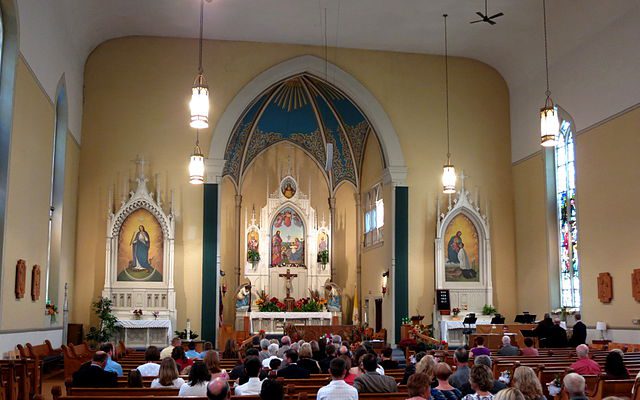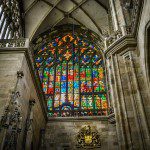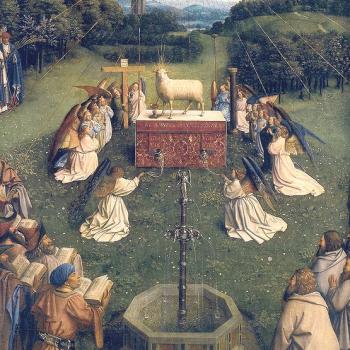
Holy Family Catholic Church (Oldenburg, Indiana). Photo by “Nheyob” (9-21-13) [Wikimedia Commons / Creative Commons Attribution-Share Alike 3.0 Unported license]
***
(11-29-07)
***
* * * * *
When I go to Mass (so I have been taught), it is just God and myself, and no one else.
Obviously, the others who are there exist, too! The Church was meant to be a community. Take, for example, the Last Supper, our model for the Holy Eucharist, and in fact, the literal beginning of that rite, which is, of course central to the Mass. It wouldn’t make sense that it was only He and John present, or He and Peter, etc. No; He was there with all twelve disciples. It was a Passover meal, after all, which was certainly a communal, family event. hence, Jesus said (to all the disciples): “I have earnestly desired to eat this passover with you before I suffer” (Luke 22:15; RSV)
I’m not there to talk to other parishioners, but to God.
During the Mass, that is certainly true. But that doesn’t mean it is not a community, with all doing the liturgy and offering the Sacrifice of the Mass together with the priest.
It is a vertical relationship of myself and God, as opposed to a “communal gathering.” I join my prayer with that of others in those parts of the Mass where all participate, but it is essentially “He and I.”
I don’t understand why you draw this distinction, since you deny that it is a “communal gathering” yet you join your prayers with those of the priest and laypeople present. Isn’t that a contradiction? It’s not just “Jesus and Me” in the Mass: it is the communal sense of “Jesus and His Church; His Bride.” It is the Church that gathers, not a collection of atomistic individuals, who happen to be there together at that particular time.
“Praying in community” is not a Catholic notion and shouldn’t be forced on Catholics. We reply as a “family of God” only when we respond to the priest’s prayers.
The Mass necessarily involves a collective, communitarian sense. It is indeed the entire congregation offering the Mass together. The priest presides, but he is not the only one making the offering. The Catechism of the Catholic Church makes this quite clear in many entries (my bolded emphases added):
- 1352 The anaphora: with the Eucharistic Prayer – the prayer of thanksgiving and consecration – we come to the heart and summit of the celebration:
- In the preface, the Church gives thanks to the Father, through Christ, in the Holy Spirit, for all his works: creation, redemption, and sanctification. The whole community thus joins in the unending praise that the Church in heaven, the angels and all the saints, sing to the thrice-holy God.
- 1353 In the epiclesis, the Church asks the Father to send his Holy Spirit (or the power of his blessing) on the bread and wine, so that by his power they may become the body and blood of Jesus Christ and so that those who take part in the Eucharist may be one body and one spirit (some liturgical traditions put the epiclesis after the anamnesis). [first part]
- 1354 In the anamnesis that follows, the Church calls to mind the Passion, resurrection, and glorious return of Christ Jesus; she presents to the Father the offering of his Son which reconciles us with him.
- In the intercessions, the Church indicates that the Eucharist is celebrated in communion with the whole Church in heaven and on earth, the living and the dead, and in communion with the pastors of the Church, the Pope, the diocesan bishop, his presbyterium and his deacons, and all the bishops of the whole world together with their Churches.
- 1357 We carry out this command of the Lord by celebrating the memorial of his sacrifice. In so doing, we offer to the Father what he has himself given us: the gifts of his creation, bread and wine which, by the power of the Holy Spirit and by the words of Christ, have become the body and blood of Christ. Christ is thus really and mysteriously made present.
- 1359 The Eucharist, the sacrament of our salvation accomplished by Christ on the cross, is also a sacrifice of praise in thanksgiving for the work of creation. In the Eucharistic sacrifice the whole of creation loved by God is presented to the Father through the death and the Resurrection of Christ. Through Christ the Church can offer the sacrifice of praise in thanksgiving for all that God has made good, beautiful, and just in creation and in humanity.
- 1360 The Eucharist is a sacrifice of thanksgiving to the Father, a blessing by which the Church expresses her gratitude to God for all his benefits, for all that he has accomplished through creation, redemption, and sanctification. Eucharist means first of all “thanksgiving.”
- 1361 The Eucharist is also the sacrifice of praise by which the Church sings the glory of God in the name of all creation. This sacrifice of praise is possible only through Christ: he unites the faithful to his person, to his praise, and to his intercession, so that the sacrifice of praise to the Father is offered through Christ and with him, to be acceptedin him.
- 1368 The Eucharist is also the sacrifice of the Church. The Church which is the Body of Christ participates in the offering of her Head. With him, she herself is offered whole and entire. She unites herself to his intercession with the Father for all men. In the Eucharist the sacrifice of Christ becomes also the sacrifice of the members of his Body. The lives of the faithful, their praise, sufferings, prayer, and work, are united with those of Christ and with his total offering, and so acquire a new value. Christ’s sacrifice present on the altar makes it possible for all generations of Christians to be united with his offering.
- In the catacombs the Church is often represented as a woman in prayer, arms outstretched in the praying position. Like Christ who stretched out his arms on the cross, through him, with him, and in him, she offers herself and intercedes for all men.
- 1369 The whole Church is united with the offering and intercession of Christ. . . . The community intercedes also for all ministers who, for it and with it, offer the Eucharistic sacrifice: [partial]
- 1370 To the offering of Christ are united not only the members still here on earth, but also those already in the glory of heaven. In communion with and commemorating the Blessed Virgin Mary and all the saints, the Church offers the Eucharistic sacrifice. In the Eucharist the Church is as it were at the foot of the cross with Mary, united with the offering and intercession of Christ.
Individual prayer, praise, and thanksgiving to God at various times in the Mass is fine, during periods of silence and meditation. Otherwise, we are urged to actively participate in the entire Mass, and not to be passive “spectators” or recipients. I’m not saying you aren’t participating; you clearly are, in profound ways. I’m simply disagreeing that it is not a community offering at Mass.
Protestants gather for “community prayer” because they have only the Bible and the Holy Spirit, but not the eucharistic Jesus substantially present, as we do.
Perhaps it is largely a semantic difference. I’m not denying the personal time of communion between a Catholic and and their Lord at Mass. But I think you shouldn’t deny, either, the communal aspects of the Mass. Even the Lord’s Prayer is communal: it is offered in the plural:
Our Father . . . give us this day our daily bread. . . forgive us our trespasses, as we forgive those who trespass against us . . . lead us not into temptation, but deliver us from evil . . .
There are plenty of singular prayers in the Psalms (many from David). But when Jesus taught us to pray, it was in this communal, group sense. I think that is highly significant.
My point is that the Mass is a communitarian effort insofar as the congregation actually participate in the offering. The Catechism makes this very clear. I think we’re just pointing out different aspects that complement, not contradict each other.
The Catechism shows that “community” is not “non-Catholic” at all. It’s not a liberal idea (though the liberals in the Church have clearly abused it, just like they do everything else), as you appeared to me to imply; it is an apostolic tradition idea and a Bible idea. That is where I saw that your analysis went too far, in my opinion. But most of what you expressed is fine. It’s a “both/and” scenario, not “either/or.”
I despise theological liberalism. I have a web page about it and a portion of one of my books devoted to this extremely serious error. The present issue, however, is not, I think, one having to do with any liberal or dissident notions. We mustn’t fall into the “guilt by association” fallacy. Maybe your parish has some goofy stuff going on, but that doesn’t mean we should throw out the baby with the bath water. Can we agree that what you are stressing and what I am stressing are both true?












